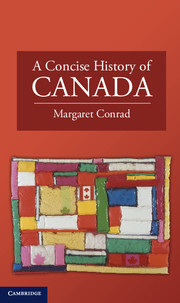Book contents
- Frontmatter
- Contents
- Illustrations
- Acknowledgements
- Introduction A Cautious Country
- 1 Since Time Immemorial
- 2 Natives and Newcomers, 1000–1661
- 3 New France, 1661–1763
- 4 A Revolutionary Age, 1763–1821
- 5 Transatlantic Communities, 1815–1849
- 6 Coming Together, 1849–1885
- 7 Making Progress, 1885–1914
- 8 Hanging On, 1914–1945
- 9 Liberalism Triumphant, 1945–1984
- 10 Interesting Times, 1984–2011
- Notes
- Guide to Further Reading
- Index
7 - Making Progress, 1885–1914
Published online by Cambridge University Press: 05 June 2012
- Frontmatter
- Contents
- Illustrations
- Acknowledgements
- Introduction A Cautious Country
- 1 Since Time Immemorial
- 2 Natives and Newcomers, 1000–1661
- 3 New France, 1661–1763
- 4 A Revolutionary Age, 1763–1821
- 5 Transatlantic Communities, 1815–1849
- 6 Coming Together, 1849–1885
- 7 Making Progress, 1885–1914
- 8 Hanging On, 1914–1945
- 9 Liberalism Triumphant, 1945–1984
- 10 Interesting Times, 1984–2011
- Notes
- Guide to Further Reading
- Index
Summary
Between 1885 and 1914, Canada’s development strategy began to yield dividends. The population doubled, economic growth skyrocketed, and the “last best west” came into its own (Image 7.1). With cities emerging as buzzing hives of activity, nearly 40 percent of Canada’s 8 million inhabitants lived in urban areas by 1914. Such a massive transformation inevitably brought new tensions and exacerbated old ones. The even more spectacular growth of the United States in this period prompted some Canadians to argue for annexation as a solution to the nation’s ills, but the British connection served as a powerful countervailing force and was the reason why Canada, still a colony politically and psychologically, became engulfed in a European war in 1914.
CULTURAL CONFLICT
National unity remained a major challenge for Canadian prime ministers. In Quebec, where the Northwest uprising was perceived as a struggle for French language and Catholic religious rights, Riel’s execution in 1885 was widely condemned and brought an astonishing fifty thousand people out in protest in Montreal. Drawing on this discontent, Liberals and disaffected Conservatives in Quebec founded the Parti national under the leadership of Honoré Mercier. The new party’s success in the 1886 provincial election signaled the collapse of the political alliance between the Conservative Party and the Roman Catholic Church that had prevailed since the 1850s. In the federal election of 1887, the Liberals won nearly half the seats in Quebec, where nationalist feelings continued to gain ground. In the Maritimes, Acadians also embraced the discourse of nationalism, attempting in a series of congresses to distinguish their identity from that of their francophone cousins in Quebec.
- Type
- Chapter
- Information
- A Concise History of Canada , pp. 164 - 193Publisher: Cambridge University PressPrint publication year: 2012



